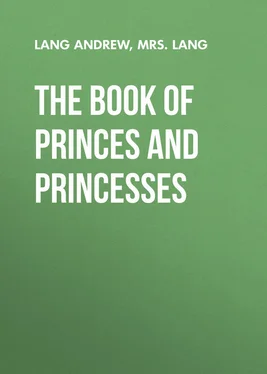Array Lang - The Book of Princes and Princesses
Здесь есть возможность читать онлайн «Array Lang - The Book of Princes and Princesses» — ознакомительный отрывок электронной книги совершенно бесплатно, а после прочтения отрывка купить полную версию. В некоторых случаях можно слушать аудио, скачать через торрент в формате fb2 и присутствует краткое содержание. Жанр: foreign_antique, foreign_prose, на английском языке. Описание произведения, (предисловие) а так же отзывы посетителей доступны на портале библиотеки ЛибКат.
- Название:The Book of Princes and Princesses
- Автор:
- Жанр:
- Год:неизвестен
- ISBN:нет данных
- Рейтинг книги:3 / 5. Голосов: 1
-
Избранное:Добавить в избранное
- Отзывы:
-
Ваша оценка:
- 60
- 1
- 2
- 3
- 4
- 5
The Book of Princes and Princesses: краткое содержание, описание и аннотация
Предлагаем к чтению аннотацию, описание, краткое содержание или предисловие (зависит от того, что написал сам автор книги «The Book of Princes and Princesses»). Если вы не нашли необходимую информацию о книге — напишите в комментариях, мы постараемся отыскать её.
The Book of Princes and Princesses — читать онлайн ознакомительный отрывок
Ниже представлен текст книги, разбитый по страницам. Система сохранения места последней прочитанной страницы, позволяет с удобством читать онлайн бесплатно книгу «The Book of Princes and Princesses», без необходимости каждый раз заново искать на чём Вы остановились. Поставьте закладку, и сможете в любой момент перейти на страницу, на которой закончили чтение.
Интервал:
Закладка:
Quite firm in her resolve, Jeanne rode out from Plessis two days after, accompanied by Madame de Silly, and followed by the chief officers of the household and a guard of soldiers. Her spirits rose as they left the gloomy woods and gloomier towers behind them, and passed into the spring sunshine, and the lovely gardens of the valley of the Loire. Much too soon for Jeanne's wishes they reached Paris, and went straight to the palace of the Louvre. After she had changed her riding dress for a beautiful garment of blue velvet, with a chemisette and high collar of fine lace, she was summoned to the king's apartments, where he stood with the Duke of Clèves. If Jeanne had not been so determined to hate him, she would have been forced to admit that he was very handsome and manly, and that he moved and spoke with the ease and grace so highly prized in the Court of France. As it was, she stared at him rudely, and would scarcely answer any of his pretty speeches, and altogether (if she could only have known it) behaved more like the naughty little girl she was than like the grown-up woman she thought herself to be. As was natural, nothing came of this conduct, except that the king became extremely angry with her, and Madame de Silly was obliged to give her a scolding, and show her that she would not advance her cause with her uncle, whose mind was set on the marriage, and only make her future husband to despise and dislike her.
'I certainly fail to see what I am to gain by leaving France and my own kingdom in order to marry a duke of Clèves,' Jeanne answered contemptuously; and her governess, knowing that in this mood nothing was to be done with her, left her to herself. Later in the day, Madame de Silly was sent for by Francis, whom she found much enraged by Jeanne's obstinacy.
'You will both set out for Alençon to-morrow morning,' he said sternly, 'and you will inform the Queen of Navarre of what has happened. I will see the princess no more till she has learned to obey me.' The news of her daughter's behaviour and her brother's displeasure sorely grieved Queen Marguérite. Giving Jeanne no time to rest after her long ride, she went at once to her chamber, and begged the girl to tell her all that had happened from the very beginning. The queen listened with anger and surprise to her daughter's account of her first interview with the king, whose lightest word had always been law to her; but Jeanne no more feared her mother than she did her uncle, and could not be induced either to express any regret for what she had done or to promise obedience for the future. So, with a troubled countenance, the queen left the room, and sat down to write to Francis.
To our eyes her letter seems rather slavish, and as if she possessed no rights in her own child. She assures the king that Jeanne's parents 'had no will but his,' and that her father was 'more indignant at his daughter's conduct than he had ever been about anything.' This was hardly the truth, as Marguérite could scarcely have forgotten her husband's wrath when the marriage was first proposed, and even if he now thought it wiser to change his tone so as not to irritate his brother-in-law further, she was too clever a woman to be deceived in this, and must have guessed that, strong-willed though Jeanne was, she would not have dared to withstand them all if she had not been sure of the approval of her father. The visit to Alençon must have been rather unpleasant for everyone, for when the queen was not employed in trying to persuade her daughter to comply with her uncle's desire, she was engaged in teaching her some of the principles of the Reformed religion, professed, as has been said, by the Duke of Clèves. As Jeanne was at this time a devout Catholic, these lessons only served to exasperate her further, and it was probably a relief to all three when the Bishop of Séez, to whom the queen had entrusted the letter, returned with the answer.
It was very short, merely stating that the Queen of Navarre was to arrange without delay the ceremony of betrothal between her daughter and the Duke of Clèves, and this being over they were to go at once to Châtelherault, where the actual marriage would publicly take place. As to Marguérite's assurances of grief and abasement, scant notice was vouchsafed to them . Though Jeanne was her own daughter, and only twelve years old, the queen felt very uncomfortable as she walked up the narrow winding turret staircase which led to the girl's rooms. Jeanne turned first red and then white as she glanced at the letter in her mother's hand, but she listened without interruption while it was being read out to her. The queen was a little surprised at this, and felt she was getting on better than she expected; but when she had ended, and raised her eyes to Jeanne's face, what she saw there froze her into silence. In a moment more the storm broke, and such a torrent of reproaches flowed from the princess – reproaches as to the sacrifice that was to be made of her, of the misery to which they wished to condemn her, and of her firm resolve never to utter the vows which would make her the duke's wife – that for a while the queen felt quite stunned. It was seldom indeed that a mother of those days listened to such words from her daughter. At length she recovered her presence of mind.
'Cease, Jeanne,' she said, laying her hand on the child's shoulder, 'is it thus you have learned your duty to me? Be quiet instantly, or I shall have to whip you as if you were a little girl again.'
The outburst of fury had somewhat exhausted Jeanne, and she felt rather ashamed of her anger. Not because, as she told herself eagerly, she retracted anything – it was all quite true; but perhaps she had behaved in an undignified way, and in a manner unbecoming a princess. So she made no reply, but began to think out another plan, and the result was a paper protesting at being forced against her will into this marriage. If she really composed it – it is certainly written in her own hand – it is surprisingly clever for a child of twelve; but it is possible that she may have been helped by one of the three officials who were witnesses of her signature. In any case, however, it was of no use, for the betrothal took place as arranged, and the public marriage at Châtelherault followed it. Outwardly, Jeanne had resolved to accept the fate which she could not escape, but before leaving Alençon she wrote a second protest, declaring that as her vows were only made under force and not freely, they were null and void, and the marriage no marriage.
Francis I. was much relieved when he saw his niece ride up to the gate of the castle. Powerful though he was, Jeanne's opposition had caused him to feel uneasy as well as irritated; he could not have told what he feared, but he was aware that a burden rolled off him as she dismounted from her horse and walked towards the great door. He left the windows at once, in order to welcome her, so he did not notice the bridegroom hold out his hand to lead her up the steps, nor the air with which the bride repulsed him. Poor bridegroom! he was having a very unpleasant time, and it was well for him that he had a charming mother-in-law to talk to, who more than made up for the loss of her sulky daughter.
By the king's orders the marriage festivities were to be on the grandest possible scale, and Marguérite had given special care to Jeanne's dress. The jewels on her long robe of cloth of gold dazzled the eyes of the spectators, and her velvet mantle was broidered with ermine. No wonder that on a hot July day the weight of these clothes felt enormous, and Jeanne had some show of reason on her side when she told her uncle, who came forward to lead her to the altar, that she really could not move from her chair. Francis was naturally very much provoked, but not deigning to notice such childish behaviour, he turned to the constable, M. de Montmorency, and bade him carry the bride into the chapel. The constable fulfilled his orders, and set down Jeanne in her place by the side of the duke, the royal family feeling truly thankful that she had not kicked or struggled, as they fully expected her to do.
Читать дальшеИнтервал:
Закладка:
Похожие книги на «The Book of Princes and Princesses»
Представляем Вашему вниманию похожие книги на «The Book of Princes and Princesses» списком для выбора. Мы отобрали схожую по названию и смыслу литературу в надежде предоставить читателям больше вариантов отыскать новые, интересные, ещё непрочитанные произведения.
Обсуждение, отзывы о книге «The Book of Princes and Princesses» и просто собственные мнения читателей. Оставьте ваши комментарии, напишите, что Вы думаете о произведении, его смысле или главных героях. Укажите что конкретно понравилось, а что нет, и почему Вы так считаете.












